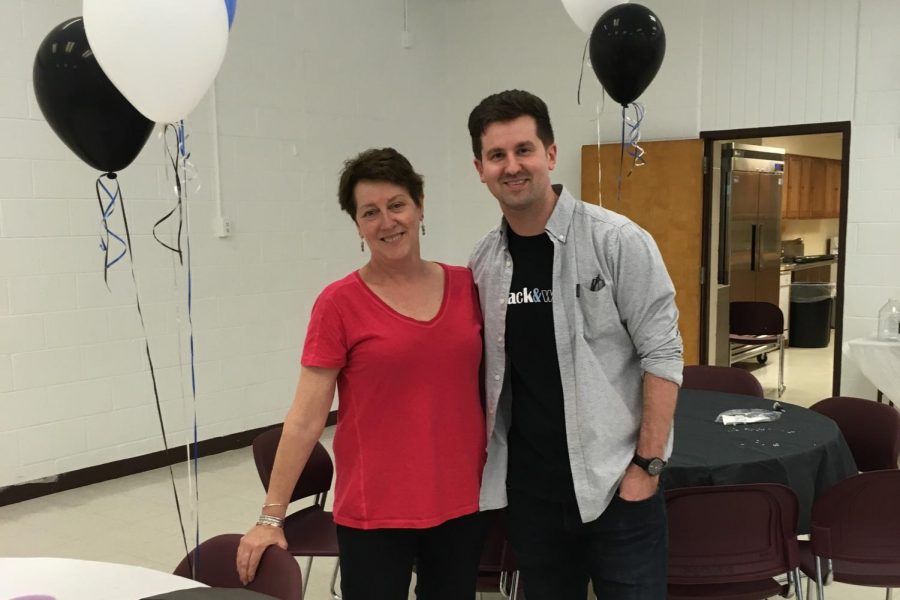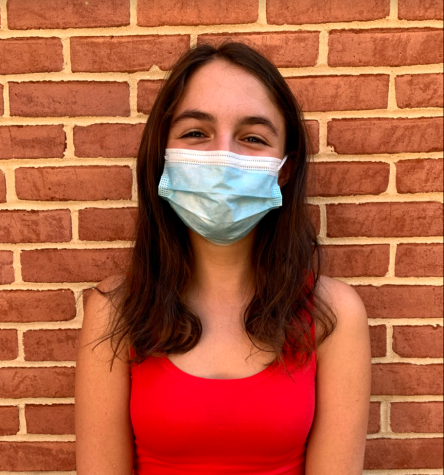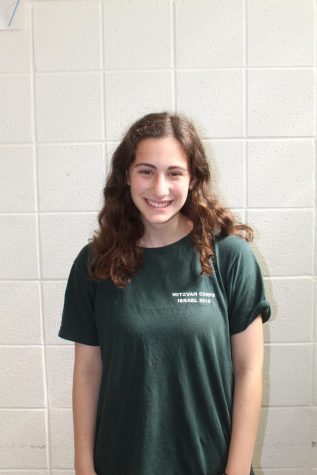Reynolds retires after 23 years at Whitman
Former students reflect on her long-lasting impact
Reynolds and her successor, Ryan Derenberger. She was the Black & White advisor from 2007 until 2019 and created a “familial” environment.
July 6, 2020
Sitting at her desk in the corner of room B212, armed with her signature purple pen, English teacher Louise Reynolds worked her way through a stack of drafts a few inches thick, marking them up with edits until she could barely see the page. Former Black & White Online Editor-in-Chief Maureen Saylor (‘09) knew that although Reynolds was tough with her edits, she would always be there to stand up for her students.
“She could really tear apart a draft, but it was always in service of making you a better writer and of making you a better questioner and thinker,” Saylor said.
Now, Reynolds, an English teacher and the former Black & White adviser, is retiring after 23 years. Her successor is English teacher Ryan Derenberger, who took over the role this past school year.
Reynolds decided to teach journalism in the second half of her career as an educator after her husband Jim Kuhnhenn, who works in the journalism field, suggested she apply for the job. Kuhnhenn told her that he’d help her and that they would “have a lot to talk about.”
“He’s heard all my stories for the last 20 years,” Reynolds said.
Prior to landing her first teaching job, Reynolds worked with artists in Kansas City to make boxes and portfolios for their books and prints using a form of printing known as letterpress. In her 23 years at Whitman, she has taught 10th, 11th and 12th grade English, as well as Intro to Journalism and creative writing. Her favorite role, she said, will always be as the adviser to The Black & White.
“Because it was challenging in so many ways, no two days were ever the same and kids generally knew they were doing good and important work,” Reynolds said. “We all felt rewarded.”
In fact, Reynolds came to love and believe in journalism so much that she wished her role as a journalist had been her first and only career path.
“If I believed in reincarnation and was reborn, if I had the time to do it, I would have been a journalist,” she said. “I came to believe, probably at the end of the first year, really profoundly in the power and the need for journalism, and especially now, especially now when journalists are being attacked in these protests — it’s more important than ever.”
Since Reynolds took over the Black & White adviser role in 2007, she has created a “familial” and “free-thinking” environment while maintaining the same level of expectation for her writers as would the head of any professional newsroom. She wanted her students to write the truth, and she gave them the tools and autonomy to do so, former Print Managing Editor Jessica Buxbaum (‘19) said.
“There was a lot of trust between her and us,” Buxbaum said. “I think she was the first sort of teacher or adviser to really give us adult-level responsibilities and trust us like adults.”
Over 100 Black & White alumni echoed Buxbaum’s sentiment during a Zoom call May 21 to honor and thank Reynolds for her years of commitment to both the publication and the entire Whitman community. Former Black & White writers and editors from every volume since 2007 came to share their favorite stories and memories of their beloved adviser. An English student of hers from 2004 even logged on.
Reynolds made The Black & White a space for her students to grow and take risks, Saylor said. She remembers how, even when students didn’t believe in themselves, Reynolds was confident in their “capabilities as writers and editors and leaders.”
Reynolds exposed her students to the challenges of being a journalist instead of avoiding them, Print Editor-in-Chief Sara Cutler (‘12) said. Reynolds guided Cutler and the rest of the Volume 50 staff through budget cuts, for which they accommodated by printing some issues without color. Cutler still uses the writing skills she learned from The Black & White daily as an analyst with the Department of Defense.
As 24-hour news cycles became the new norm in the 21st century, journalism readership began to shift from print to online. Former Editor-at-Large Maryam Abutaleb (‘12) said that the Black & White staff at the time reacted begrudgingly towards the shift; the students felt that the online platform wouldn’t get as many readers. Reynolds, however, took the time to dismantle her students’ perception that the move was about their own work as journalists, reasoning instead that it reflected “journalism as a whole.”
“There’s a new depth and seriousness to reporting,” Reynolds said about the current Black & White. “There has definitely been a shift over to the more personal stories as well, even in the last few years.”
Buxbaum remembers staying late at school for several nights to edit a story about consent. The editors working on the story and the writer, Alex Robinson (‘20), were unsure of how to approach the sensitive topic, but they sat down with Reynolds and had a lengthy, in-depth conversation that transformed the story from an average piece into a meaningful one.
“I definitely don’t think my consent story was an isolated incident,” Robinson said. “I know tons of writers who had similar experiences, and what made Ms. Reynolds such an amazing adviser and mentor was that she was able to look at stories with an inquisitive eye and know exactly what needed to happen to make it better.”
In the two years principal Robert Dodd has spent at Whitman, Reynolds’ immense impact became beyond evident to him, he said.
“I think her impact runs deep, in that she was an exceptional teacher and really taught kids to be great writers,” Dodd said. “She makes them better, powerful and more impactful writers, which is a strength of hers and something she’s done for decades at Whitman.”
Under Reynolds’ tenure, The Black & White won numerous awards, as did its writers, including the prestigious Columbia Scholastic Press Association Gold Circle.
“She passed onto me the most efficient project-based classroom I can imagine,” Derenberger said. “Her ethic and ideas live on in the work of every editor and writer in my classroom.”
In the invitation to her Zoom retirement celebration, Derenberger wrote of Reynolds’ consistent incorporation of technology into the journalistic process. She pioneered the use of cloud collaboration, he said, enabling editors to have access to student writers’ work “at every step of the reporting and drafting process.”
“Her torch remains brightly lit,” he said.
Although she’ll miss the “intellectual stimulation” of teaching and the “camaraderie” of her colleagues, Reynolds is excited to spend more time hiking, gardening and finally reading books for pure enjoyment, she said.
Reynolds has affected her students beyond their time at Whitman. During the retirement celebration, several alumni shared that they had successfully pursued careers in journalism, holding positions at top news organizations including USA Today and The Washington Post. Still others pursued journalism-adjacent careers, like former Print Managing Editor Melanie Goldberg (‘12), who says she owes a huge part of her current career as an intelligence analyst to Reynolds.
A number of Reynolds’ former students are also currently pursuing degrees in journalism, including former Print Editor-in-Chief Eva Herscowitz (‘19), who is now a student at Northwestern University and the assistant city editor at the school’s paper, The Daily Northwestern.
“It would be the highlight of my teaching career as far as memorable moments go,” Reynolds said of the Zoom celebration. “Teaching is a lot of work; you put a lot of yourself into it. And when it comes back and people still have a little piece of you, it means so much.”









